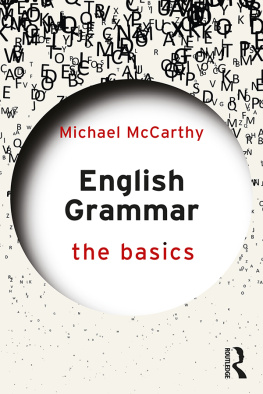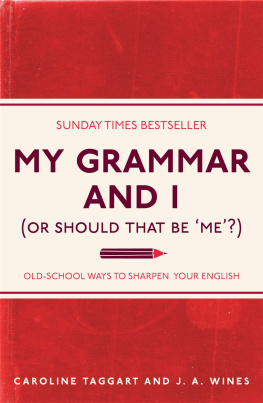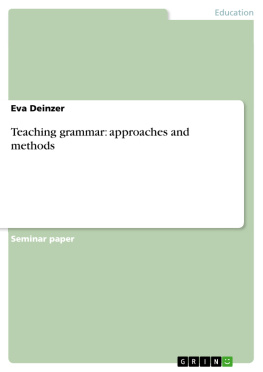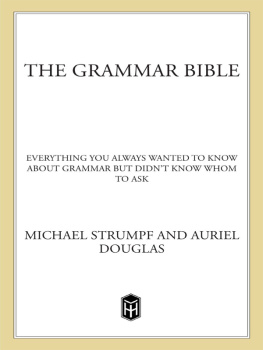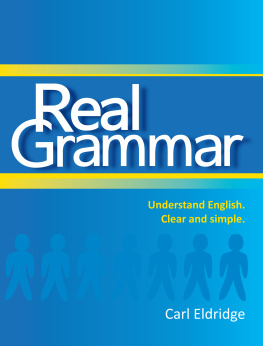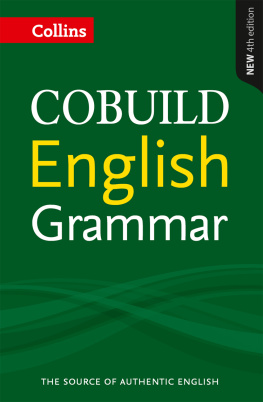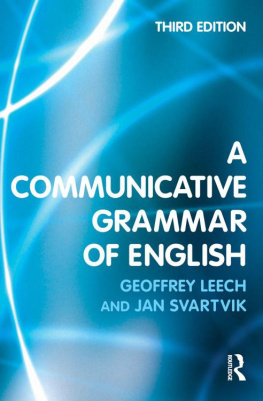English Grammar
THE BASICS
English Grammar: The Basics offers a clear, non-jargonistic introduction to English grammar and its place in society. Rather than taking a prescriptive approach, this book helps the reader become aware of the social implications of choices they make to use standard or non-standard (regional/dialect) forms.
Readers will consider:
- what grammar is and how it fits into the structure of language;
- how grammar functions in the school curriculum, the press, broadcasting and social media, as well as how these outlets reflect and reinforce our attitudes towards grammar;
- differences between speech and writing, as well as between formality and informality;
- major different approaches to theorising and describing grammar from important grammarians, including Noam Chomsky and Michael Halliday.
Featuring a glossary of key terms and practical tips and insights from the authors 50+ years of language teaching experience around the world, this book is for anyone who has ever found themselves questioning the rules of the English language.
Michael McCarthy is Emeritus Professor of Applied Linguistics, University of Nottingham, and Adjunct Professor of Applied Linguistics, University of Limerick. He has (co-)authored and edited 54 books and is co-founder (with Ronald Carter) of the CANCODE spoken English corpus. He has lectured in 46 countries and has been involved in language teaching and applied linguistics for 55 years.
The Basics
The Basics is a highly successful series of accessible guidebooks which provide an overview of the fundamental principles of a subject area in a jargon-free and undaunting format.
Intended for students approaching a subject for the first time, the books both introduce the essentials of a subject and provide an ideal springboard for further study. With over 50 titles spanning subjects from artificial intelligence (AI) to womens studies, The Basics are an ideal starting point for students seeking to understand a subject area.
Each text comes with recommendations for further study and gradually introduces the complexities and nuances within a subject.
SUSTAINABILITY (SECOND EDITION)
PETER JACQUES
TRANSLATION
JULIANE HOUSE
TRANSNATIONAL LITERATURE
PAUL JAY
TOWN PLANNING
TONY HALL
WOMENS STUDIES (SECOND EDITION)
BONNIE G. SMITH
ENGLISH GRAMMAR
MICHAEL MCCARTHY
For a full list of titles in this series, please visit www.routledge.com/The-Basics/book-series/B
First published 2021
by Routledge
2 Park Square, Milton Park, Abingdon, Oxon OX14 4RN
and by Routledge
605 Third Avenue, New York, NY 10158
Routledge is an imprint of the Taylor & Francis Group, an informa business
2021 Michael McCarthy
The right of Michael McCarthy to be identified as author of this work has been asserted by him in accordance with sections 77 and 78 of the Copyright, Designs and Patents Act 1988.
All rights reserved. No part of this book may be reprinted or reproduced or utilised in any form or by any electronic, mechanical, or other means, now known or hereafter invented, including photocopying and recording, or in any information storage or retrieval system, without permission in writing from the publishers.
Trademark notice: Product or corporate names may be trademarks or registered trademarks, and are used only for identification and explanation without intent to infringe.
British Library Cataloguing-in-Publication Data
A catalogue record for this book is available from the British Library
Library of Congress Cataloging-in-Publication Data
Names: McCarthy, Michael, 1947- author.
Title: English grammar : the basics / Michael McCarthy.
Description: Abingdon, Oxon ; New York, NY : Routledge, 2021. | Includes bibliographical references and index. |
Identifiers: LCCN 2020054550 (print) | LCCN 2020054551 (ebook) | ISBN 9780367633660 (hardback) | ISBN 9780367633653 (paperback) | ISBN 9780367633677 (ebook)
Subjects: LCSH: English language--Grammar. | English language--Social aspects.
Classification: LCC PE1106 .M36 2021 (print) | LCC PE1106 (ebook) | DDC 428.2--dc23
LC record available at https://lccn.loc.gov/2020054550
LC ebook record available at https://lccn.loc.gov/2020054551
ISBN: 978-0-367-63366-0 (hbk)
ISBN: 978-0-367-63365-3 (pbk)
ISBN: 978-0-367-63367-7 (ebk)
For Jeanne
Rebecca Howling for supplying the Russian nested dolls (p. 47).
David Mitchell for supplying the African chess set (p. 104).
Jake Tebbit for permission to reproduce the illustrations on pp. 121 and 164.
This book gives you the basics of grammar. It is not a reference book and it is not a grammar exercise book. It does not tell you everything about English grammar. It just takes you through the basic concepts and terminology you will need if you are a schoolteacher teaching English, a teacher of English in training, a student doing your school-leaving exams or an undergraduate starting a degree course in English language or linguistics. And if you are none of these, you may find it interesting and useful in your daily life. A lot of people struggle with grammar because they never did any at school; this book, I hope, will go towards making up for that.
Knowing about grammar involves more than just knowing terminology and how to construct good sentences. It is also useful to know what theories lie behind different ways of looking at grammar, what we mean by dialect grammar, traditional grammar or standard grammar, and if you never did any grammar at school, why that was so. Knowing about grammar means appreciating that there is not just one English grammar but that there are different varieties of English grammar around the world. It also means understanding why ordinary people who are not academics have strong attitudes about grammar. This book covers all those topics, and Ive tried to make them as enjoyable as possible.
By the end of the book, you will know the basics, but I hope you will want to go on and learn about grammar in the books and articles that I refer to. Grammar is a fascinating subject. I hope you enjoy reading the book as much as I enjoyed writing it.
If you never studied linguistics, you might be baffled if you saw the word morphosyntax, a technical term known to linguists which refers to rules that explain how items are related to one another in language. But you would probably feel reasonably familiar with the word grammar if it cropped up in conversation. Grammar is also a technical term in the study of language but at the same time it is a word people use in their everyday language about language, as familiar as spelling or punctuation.
Most non-specialists consider grammar to be the correct application of a set of rules that are written down somewhere, passed down through the generations and taught in schools. These rules are usually thought of as logical and abstract.
However, people often confess that their own grammar is not what it should be, or that they were never taught grammar at school, or that they cant be bothered with it anyway. Often, if you pursue the question, they include their inability to spell tricky words, or not knowing when to use a comma (is it

